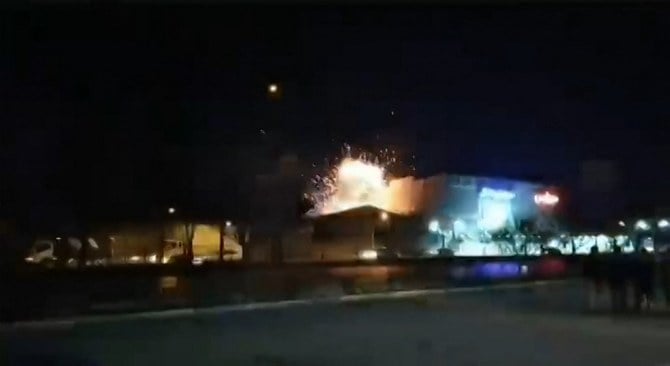
The conflict between Iran and Israel has been escalating in the last few weeks, highlighted by the Israeli Defense Forces’ series of airstrikes against Tehran regime targets in Syria. This is not the first time that Israel has launched airstrikes against Iranian bases in Syria. In May 2018, after Iran reportedly fired several rockets into Israel, Tel Aviv carried out a large-scale attack on Iranian targets. Nevertheless, when it comes to the intensity of airstrikes and the number of casualties, the latest attack on Iran’s targets was considered the most serious, as 11 people were killed.
The latest developments also point to a significant shift in Israel’s policy toward Iran and its staunchest ally, Syria. While Israel used to keep its operations against Iranian targets in Syria covert, recently it has been going public and taking responsibility for them. Israeli Prime Minister Benjamin Netanyahu made the government’s policy clear, saying: “The air force strongly attacked Iranian targets in Syria after Iran launched a missile from there at our territory…We will not ignore such acts of aggression.” Going public backs up the idea that Israel is increasingly prepared to resort to its military power to force the Iranian presence out of Syria.
Major Iranian media outlets, including the state-run FARS News Agency, have downplayed the Israeli operation, arguing that it caused no casualties. The Islamic Republic is attempting to conceal the fact that it endured a blow from its enemy and that the airstrikes inflicted significant damage on some of its units in Syria.
But Tehran is not likely to leave Syria as a result of Israel’s airstrikes. Since the Islamic Republic came to power in 1979, it has tried to pressure its main rival by increasing its military presence near the Israeli border. Tehran succeeded in doing so in Lebanon by setting up, training, funding and arming Hezbollah. In Syria, Hafez Assad had rejected the presence of Iranian forces. Nevertheless, the country’s civil war provided a ripe environment for Tehran to accomplish its objectives through political opportunism.
Due to the Syrian regime’s military incapability and Bashar Assad’s weak leadership, the Syrian government has substantially submitted to the Iranian regime in recent years by allowing Tehran to dispatch high and mid-ranking military staff to Syria, as well as to establish an independent command and control center for drone or major military operations. The extent of the Syrian regime’s capitulation to Iran became evident when Damascus allowed Tehran to build several permanent military bases in Syria, including a recent one just 80 kilometers from the Israeli border.
From the Israeli leaders’ perspective, Iran’s military entrenchment in Syria poses a critical threat to their national security. Tehran has succeeded in setting up intelligence units and training camps in and around Damascus. It has also dispatched arms and ballistic missiles to Syria. The missiles that were fired into Israel from Syria were reportedly mainly medium-range surface-to-surface ballistic missiles that were made in Iran.
The extent of the Syrian regime’s capitulation to Iran became evident when Damascus allowed Tehran to build several permanent military bases in Syria.
Dr. Majid Rafizadeh
The major Iranian actors in Syria are the senior cadre of the Quds Force, an elite branch of the Islamic Revolutionary Guard Corps (IRGC) that is responsible for conducting operations in foreign countries and expanding the regime’s military stranglehold in the Middle East.
Israel has also become even more concerned about Iran’s military entrenchment in Syria after US President Donald Trump said Washington will be withdrawing its forces from Syria. For Israel, Washington’s decision to pull out will tip the balance of power in favor of Iran’s forces.
Iranian leaders will most likely attempt to increase the tensions by using anti-Israeli statements. According to the Fars News Agency, a senior Iranian official and aide to Iran’s Supreme Leader Ali Khamenei last year warned that the Islamic Republic was capable of destroying Israel. He said: “If you provide an excuse for Iran, Tel Aviv and Haifa will be razed to the ground.” Meanwhile, speaking to hardline news outlet the Young Journalists Club on Monday, Iranian Air Force commander Aziz Nassirzadeh boasted that Iran’s “current and future generations are ready, impatiently, and with every fiber of their being, for battle with the Zionist regime and to wipe it off the face of the earth.”
But the regime’s threats to directly attack Israel are most likely rhetoric. For almost four decades, the modus operandi of Iran has been to use asymmetrical warfare, militias or foreign territories to target Israel. Tehran is cognizant of the fact that it cannot afford to launch a direct military war with Israel. In addition, the younger generation of Iranians are disaffected and disenchanted with the regime; they are not ready or impatient to help the regime with its military adventurism in the region.
But, as long as Iran’s military entrenchment in Syria continues, tensions between Israel and Tehran will most likely escalate.
Dr. Majid Rafizadeh is a Harvard-educated Iranian-American political scientist. He is a leading expert on Iran and US foreign policy, a businessman and president of the International American Council. He serves on the boards of the Harvard International Review, the Harvard International Relations Council and the US-Middle East Chamber for Commerce and Business. Twitter: @Dr_Rafizadeh










